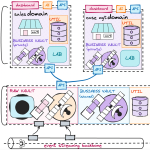
Let’s face it—most mainstream tech tools treat your personal data like a free buffet. Every click, search, or upload is scooped up, analyzed, and often sold. But what if you could reclaim control? Here’s the deal: privacy-focused alternatives exist for nearly every app or service you use daily. Some trade a bit of convenience for security, but honestly? The trade-off is worth it.
Why Ditch Mainstream Tools?
You might think, “I’ve got nothing to hide.” Well, privacy isn’t just about secrecy—it’s about autonomy. Imagine your inbox scanning emails to serve ads, or your notes app mining data for “improvements.” Creepy, right? Here’s what mainstream tools often do:
- Track your activity across apps and websites
- Sell or share data with third parties (sometimes vaguely “anonymized”)
- Require invasive permissions (why does a flashlight app need location access?)
- Store data on centralized servers, ripe for breaches
Privacy-Focused Swaps for Everyday Tools
Search Engines: Ditch Google
Google’s search dominance comes with a cost: your queries fuel its ad empire. Try these instead:
- DuckDuckGo – No tracking, no profiling, just search results. Bonus: it uses !bangs for quick shortcuts (like !a for Amazon).
- Startpage – Delivers Google results without handing your data to Google. Meta, right?
- Searx – A self-hostable, open-source aggregator that pulls from multiple engines.
Email: Escape the Gmail Vortex
Gmail scans emails for ads (even if they claim they’ve stopped). For encrypted, ad-free alternatives:
- ProtonMail – End-to-end encryption by default, based in Switzerland (hello, strict privacy laws).
- Tutanota – German-based, open-source, and offers encrypted calendars too.
- Mailbox.org – Paid, but packed with features like encrypted storage and aliases.
Cloud Storage: Beyond Dropbox and Google Drive
Storing files on mainstream platforms is like leaving your diary in a busy café. These options encrypt data before it leaves your device:
- Nextcloud – Self-hosted or provider-hosted, with full control over your data.
- Syncthing – Peer-to-peer sync—no middleman servers at all.
- Cryptee – A privacy-first docs/photos platform with a sleek interface.
Messaging: Skip the Data Harvest
WhatsApp might use Signal’s encryption, but it’s still owned by Meta. For truly private chats:
- Signal – Gold standard for encryption, open-source, and minimal metadata retention.
- Session – Decentralized, anonymous accounts (no phone number needed).
- Element (Matrix) – Like Slack, but encrypted and interoperable with other apps.
Bonus: Niche Tools You Didn’t Know You Needed
Here’s where privacy gets fun—specialized tools for specific needs:
| Mainstream Tool | Privacy Alternative | Why Switch? |
| Google Analytics | Matomo | Self-hosted analytics that don’t share data with ad networks |
| Chrome | Brave or Firefox + add-ons | Blocks trackers by default; Firefox’s containers isolate logins |
| Zoom | Jitsi Meet | End-to-end encrypted video calls, no account required |
The Trade-Offs (Let’s Be Real)
Privacy tools aren’t perfect. Some lack polish or require tinkering. You might lose integrations (RIP, Google Docs add-ons). But think of it like swapping fast food for home cooking—it takes effort, but your body (or in this case, your data) thanks you.
That said, the gap is narrowing. Many alternatives now rival mainstream tools in usability—just without the surveillance baggage.
Final Thought: Small Steps Matter
You don’t need to overhaul your digital life overnight. Start with one switch—maybe your search engine or messaging app. Each step reduces your data footprint, like turning off lights in an empty room. And over time? You’ll wonder why you ever settled for less.









